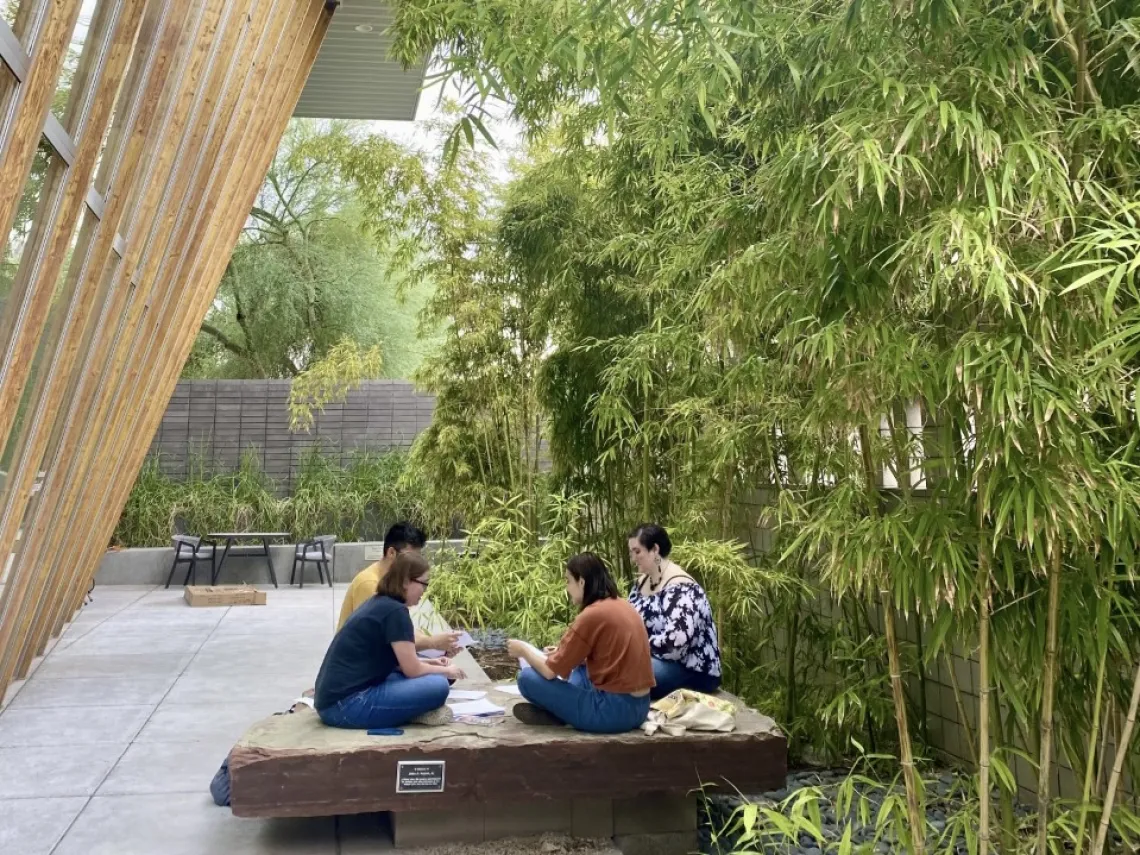
BREAK
BOUNDARIES
The Bachelor of Creative Intelligence and Innovation, inspired by the University of Technology Sydney, is a dual degree program that compliments the knowledge and ways of thinking within your primary major and prepares you to face society’s present and future challenges through experiential learning, engaged critical thinking, and transdisciplinary study. Students who don't have room in their plans for a dual degree can also earn a minor in Creative Intelligence and Innovation.
Gain critical skills that will position you for success after graduation, whether you plan to enter the workforce or pursue a postgraduate degree.
Why Creative Intelligence and Innovation?
"BCII is designed for Franke Honors students who are interested in developing their creativity, innovation, and problem-solving skills. It equips them with the skills and knowledge they need to succeed in a wide range of careers, including in the creative industries, technology, entrepreneurship, and social innovation, all of which are highly valued by employers and graduate program admissions."
John Pollard, Franke Dean, W.A. Franke Honors College
This degree teaches a transdiciplinary approach to life as everything can benefit from a holistic lens. We apply these skills to tackle real world problems and look for solutions, but not just any solutions: ones that will send waves of benevolence to everyone they touch. Besides the incredible mindset, I find Problems to Possibilities rewarding because it has brought me to my childhood. I remember when I was younger my mind would run with ideas, questions, and solutions. I hadn't felt that again until BCII. My drive to face and overcome challenges has been renewed.
Isabella Ducey, BCII student, W.A. Franke Honors College
Spring 2025 BCII Courses
HNRS 271-001: Creative Practice and Methods
Instructor: Meg Lota Brown
Mon/Wed/Fri | 2:00 PM - 4:00 PM | Hybrid (In-Person & Live Online)
First Seven Weeks
Explore creative approaches to solving complex problems.
HNRS 371-001: Creativity and Complexity
Instructor: Matthew Mars
Mon/Wed/Fri | 2:00 PM - 4:00 PM | Hybrid (In-Person & Live Online)
Second Seven Weeks
Come and learn the different techniques and systems of linguistics, nature, mathematics, and more- through an Honors interdiciplinary lens that focuses on making positive changes through creative and complex inquiries.
HNRS 314-101: Ideas Into Action
Instructor: Laura Horley
Mon/Wed | 12:30 PM - 1:45 PM | In Person
Be part of this community and civic engagement course and learn to seek, evolve, and come up creative solutions to different social issues.
HNRS 473-001: Envisioning Futures
Instructor: Hsain Ilahiane
Tues/Thurs | 2:00 PM - 3:15 PM | In-Person
In this course students are challenged to explore the generative nature of innovation, inspiration and learning in the context of imagined future worlds. Come and explore this Bachelor of Creative Intelligence course and move forward in creating a better future.
BCII GRADUATES ARE READY FOR WHAT'S NEXT
The BCll degree is designed to give graduates an innovative edge in their chosen profession. With a focus on developing unique projects and solutions to a wide range of challenges, BCll students are encouraged to create jobs and opportunities for the future, as well as meet the demands from industry for a more creative and innovative workforce.
Futureproof
Comprehensive
Transformational
The Learning Experience
Franke Honors students can pair the BCII degree with any other major from the University of Arizona and explore transdisciplinary perspectives alongside diverse faculty from multiple disciplines. The curriculum consists of several core courses, an internship, and a capstone project that aligns with the existing Honors Thesis requirement. Courses are taught in a way that empowers you to innovate and experience rather than observe and absorb; they favor hackathons, think tanks, and creative labs over lectures and tutorials.
Students who are interested in the coursework but don't have room for another degree in their plans can complete the Creative Intelligence and Innovation Minor (CII).
Course Examples
Problems to Possibilities
Tackle complex, dynamic, and networked problems. Analyze challenges from multiple perspectives and discover new possibilities. Develop and hone skills in team collaboration, visualization, modeling, representation, and presentation.
Creative Practice and Methods
Collaboratively explore problems, generate solutions, develop visual literacy in dealing with complexity, and create frameworks for critiquing proposals. Built on values such as risk-taking and inquisitiveness, students challenge their own ideas for building and running a creative practice through undertaking a central project for an external partner.
Envisioning Futures
Explore emerging ideas and articulate original future visions. Examine assumptions and research agendas to optimize future innovation approaches from a range of perspectives. Culminates in a public event where audiences interact with student-envisioned futures.
Frequently Asked Questions
Before you officially enroll in the degree program, you will need to take one of the two introductory courses, HNRS 270: Problems to Possibilities or HNRS 271: Creative Practice and Methods. Once you have completed one of those courses, you will be able to officially enroll in the degree and take upper level classes.
Yes, you can take HNRS 270: Problems to Possibilities and HNRS 271: Creative Practice and Methods prior to officially enrolling in the degree.
Students can choose between completing the BCII capstone OR completing their Honors Thesis in BCII. If you want to graduate with Honors in your primary major, you will need to complete your Honors Thesis in that major, and complete the BCII capstone to earn your BCII degree.
For example, if you are a Communications major and double majoring in BCII, you will only graduate with Honors in Communications if you complete your Thesis in Communications.
The courses required to earn a BCII degree total 33-36 units (depending on whether or not you choose to do your honors thesis in BCII). Students will still need to take the units required for their other major and general education classes in order to graduate.
Questions about how this all works? Contact your Franke Honors Advisor.
The Bachelor of Creative Intelligence and Innovation is inspired by the University of Technology Sydney.

